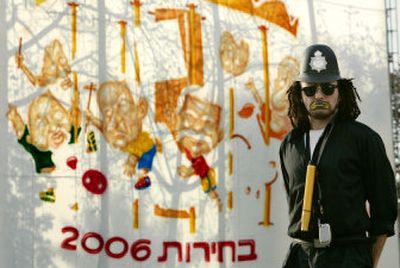Centrist party’s standing slips

JERUSALEM – Israeli police tightened security Monday on the eve of national elections as opinion polls showed the centrist Kadima party faltering, raising the possibility of a coalition government that may include hard-liners.
Kadima still holds a strong lead over the left-center Labor Party and the hawkish Likud Party, but polls showed that acting Prime Minister Ehud Olmert’s party would capture only 34 of 120 parliament seats in today’s vote, a drop from the 36 predicted last week.
Olmert has said he would not include parties in his coalition opposed to his plan to withdraw from parts of the West Bank and draw Israel’s final borders by 2010.
Candidates spent their last day Monday campaigning, targeting swing voters who pollsters say make up about 10 percent of the electorate.
Labor leader Amir Peretz handed out red carnations in Tel Aviv, while Likud’s Benjamin Netanyahu said prayers at the Western Wall, Judaism’s holiest site. Kadima’s No. 2, Foreign Minister Tzipi Livni, was to tour Jerusalem’s main outdoor market later in the day.
In Gaza City, incoming Palestinian Prime Minister Ismail Haniyeh told the Palestinian parliament he is ready to hold talks with international mediators on solving the Mideast conflict. He did not mention Israel by name, but his willingness to talk to the so-called Quartet – the United States, the United Nations, the European Union and Russia – could be a first sign of flexibility.
Hamas has rejected demands by the Quartet that it recognize Israel, renounce violence and recognize existing peace agreements, and Haniyeh did not explain how he would get around those disagreements.
“The government is ready for dialogue with the Quartet, and looking for every possible way to end the conflict and the occupation,” he said.
Parliament was to approve the Hamas government today or Wednesday.
On the eve of the election, police tightened security, fearing Palestinian militants would launch an attack in an attempt to influence the outcome of the vote, as has happened in the past. Traffic at West Bank checkpoints backed up, with soldiers conducting thorough checks on Palestinians.
Police also closed to visitors a hotly disputed holy site in the Old City of Jerusalem. The Al Aqsa Mosque compound is built on the ruins of the biblical Jewish temple. Jerusalem police spokesman Shmuel Ben-Ruby said Muslim worshippers would be allowed into the site, which is administered by Muslim authorities.
In Gaza, Israeli aircraft fired missiles Monday at a group of Palestinians preparing to launch homemade rockets at Israel, killing an Islamic Jihad militant, Palestinian security officials and the Israeli army said. Earlier, the air force fired missiles at a group of militants, wounding two people, Palestinian security officials and the army said.
In the West Bank, an Israeli military court turned down a request for bail by militant leader Ahmed Saadat, who was seized by army troops earlier this month from a Palestinian prison after a 10-hour siege. Saadat ordered the assassination of an Israeli Cabinet minister in 2001.
Monday’s polls, the last before the vote, predicted Labor would be the second-largest party in Israel’s parliament. Likud would come in third, with 13 to 15 seats, a serious blow to a party that dominated Israeli politics for most of the past three decades.
The hawkish Israel Beitenu, an immigrants’ party headed by Avigdor Lieberman, an emigre from the former Soviet Union, is expected to make a strong showing. Polls predict Lieberman will win 12 seats, up from two he holds now.
“He’s (Lieberman) not corrupt and he’ll do a lot of things that Likud couldn’t do and Olmert won’t do,” said Shimon Tubul, a 30-year-old fruit seller at Jerusalem’s outdoor market.